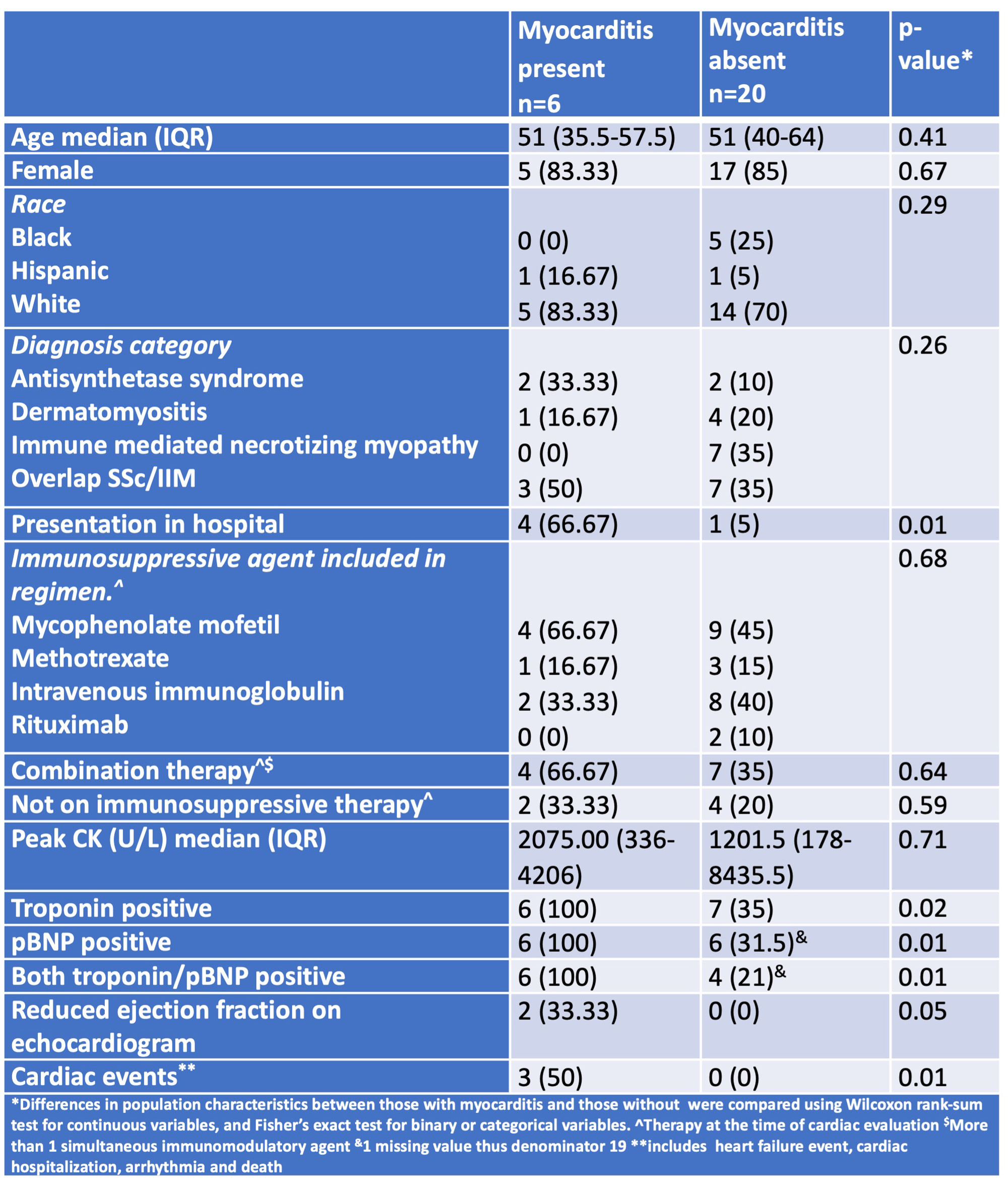Session Information
Date: Monday, November 13, 2023
Title: (1155–1182) Muscle Biology, Myositis & Myopathies – Basic & Clinical Science Poster II
Session Type: Poster Session B
Session Time: 9:00AM-11:00AM
Background/Purpose: Myocarditis in idiopathic inflammatory myopathies (IIM) is poorly understood despite its associated morbidity and mortality. As manifestations of myocarditis can be mild or subclinical in IIM, early detection is crucial to inform clinical decision-making. Currently, there is a paucity of guidance on optimal myocarditis screening among IIM patients, and there is a critical need to enhance early detection of this potentially fatal disease manifestation to improve clinical outcomes. Thus, we sought to prospectively screen newly diagnosed IIM patients in a rigorously phenotyped cohort to (i) determine the prevalence of myocarditis, (ii) identify risk factors associated with myocarditis and (iii) assess the utility of baseline serum cardiac biomarkers as initial screening to inform the need for advanced cardiac evaluation
Methods: Consecutive patients with a clinician verified new diagnosis of IIM based on either ACR/EULAR or Bohan and Peter classification criteria for IIM evaluated at a single center were recruited from 7/1/2022-3/30/2023; new diagnosis was defined as within one year of symptom onset. IIM subgroups ofpolymyositis (PM), dermatomyositis (DM), anti-synthetase syndrome (ASyS), immune-mediated necrotizing myopathy (IMNM), and overlap systemic sclerosis (SSc)/myositis were included; those with inclusion body myositis were excluded. Eligible patients underwent cardiac serum biomarkers (troponin I/high-sensitivity troponin and NT-proBNP), electrocardiography, transthoracic echocardiogram (TTE) and cardiac MRI (cMR). Lake Louise Criteria was used for the diagnosis of myocarditis by cMR requiring 2 of 3 positive criteria for evidence of hyperemia, edema, and myocardial necrosis/fibrosis. Clinical cardiac events, including heart failure events, arrhythmia events, cardiac hospitalization and death were monitored throughout follow up to 6/7/2023.
Results: Among 26 patients, 85% were female (22/26) and the most common diagnosis was that of overlap SSc/IIM (11/26; 42%) followed by IMNM (6/26; 23.1%). 15/26 (57.7%) had elevation in at least one serum biomarker, most commonly troponin I (13/15; 86.7%). 6/26 (23.1%) patients met Lake Louise Criteria by cMR for myocarditis. When compared to patients without myocarditis, those with myocarditis had numerically higher median CK (U/L) (2075.00 [IQR 336-4206] versus1201.5 [IQR 178-8435.5], p=0.71) and more frequently had elevations in both cardiac biomarkers (100% versus 21%; p=0.01) (Table 1). Among those with myocarditis, anti-Ku was the most common autoantibody (3/6), followed by anti-Scl70, anti-PL12 and anti-Zo (1/6 each). All patients with myocarditis received escalation in immunosuppressive therapy. Three patients (all with myocarditis) experienced clinical cardiac events; two were admitted for heart failure, while the other experienced arrythmia.
Conclusion: The frequency of myocarditis in this cohort was 23%. SSc/IIM overlap was the most prevalent subgroup among patients with myocarditis, suggesting that these patients may be at greater risk. All patients with myocarditis were positive for both cardiac biomarkers, which may represent a useful initial screening tool to inform the need for advanced cardiac imaging.
To cite this abstract in AMA style:
Connolly C, Lovell J, Chung M, Adler B, Albayda J, Tiniakou E, Mecoli C, Zimmerman S, Christopher-Stine L, Gilotra N, Paik J. Cardiac Biomarkers Are a Useful Initial Screening Tool for Myocarditis in Patients with Idiopathic Inflammatory Myopathies [abstract]. Arthritis Rheumatol. 2023; 75 (suppl 9). https://acrabstracts.org/abstract/cardiac-biomarkers-are-a-useful-initial-screening-tool-for-myocarditis-in-patients-with-idiopathic-inflammatory-myopathies/. Accessed .« Back to ACR Convergence 2023
ACR Meeting Abstracts - https://acrabstracts.org/abstract/cardiac-biomarkers-are-a-useful-initial-screening-tool-for-myocarditis-in-patients-with-idiopathic-inflammatory-myopathies/

